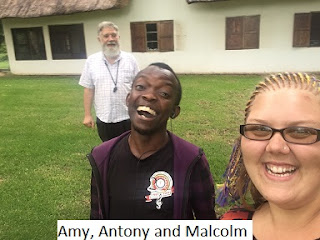Saturday, 31 March 2018
Iringa – A brief Historical and Cultural Tour
One of Malcolm’s interests is the
history of places, so last Sunday he went on a walking tour of Iringa. This was
led by a resident, Darlene, who described some of the history of the town.
The Germans first colonized Tanzania
in the 1880’s and fortified Iringa in 1890. One of the oldest buildings, built
by the Germans as a hospital, is the ‘Boma’. This has recently been renovated
and houses the small museum and was the start of the tour.
After the battle Chief Mkwawa continued to harass the Germans using Guerilla tactics until his
death, by suicide, in 1898 to avoid being captured.
One interesting thing about the
German occupation, is that they didn’t build a prison. So much more efficient to ’interrogate’ any
suspects – and then hang them!
The Germans lost Tanzania in 1916
when it became a British Protectorate.
Here you can by a wide range of
vegetable, spices and other day to day necessities.
The tour concluded with a visit
to the war cemetery which contains graves of British, Commonwealth and German
soldiers killed in both world wars as well as those of the early settlers,
Saturday, 24 March 2018
The Cat Lady Returns – and other shocking developments
A few weeks ago we reported Irene’s once-in-a lifetime experience when a cat gave birth on her lap.
And it has happened again (that’s
twice in a lifetime).
The house cat has been pregnant
and this week lay down on Irene’s lap. After a few minutes she started to
strain and before long gave birth to the first of 4 kittens. I think we have
found a new career for Irene as a birthing partner – but maybe it only works
with cats!!
In previous year’s we have talked
about some of the eccentric electrical arrangements to be found in East Africa.
Malcolm’s problem is he is too accustomed to the safety standards in Britain.
This week there was an electrical supply problem and one of our large carpentry machines was not working. When Malcolm inspected the plug there was what seemed to be a normal 13 amp fuse. Closer inspection revealed that the fuse was blown, and underneath was a spiral of wire.
It seems that fuses are unnecessary
parts of electrical equipment. Malcolm did try to buy spare fuses from a local
electrical shop and the best hardware store in Iringa, but failed. Why use a
fuse when a bit of wire will do?
To be fair plug fuses are a
British ‘thing’ – 2 pin continental and American plugs do not use them.
However, what was more worrying was that the main fuse protecting the building
had also been replaced by a piece of copper wire. This is the large 100 amp
fuse that in UK houses is sealed and should only be opened by someone from the
electricity supplier. This fuse is the
last defence against a major electrical short circuit – or would be if it is in
place.
But then, electrical problems
don’t happen in Tanzania………………..
The final 'shocking' report is Malcolm's latest culinary disaster. You would think even he could manage to use an automatic bread maker. And yes, it tasted as bad as it looks!!

Sunday, 18 March 2018
A Mother’s Pride and Joy
As last Sunday was Mothering Sunday our eldest son asked Malcolm to take Irene out for the best meal in Iringa.
So we went to an Italian
Restaurant, Mama Iringa’s on the outskirts of the town.
There we had a nice meal whilst
enjoying the view of the garden.
In Tanzania people are imaginative
about what they make furniture from.
Back at Neema Maneno has been
firing some new mugs for the shop.
Labels:
Iringa,
Neema Crafts,
Pottery,
Tanzania
Saturday, 10 March 2018
New Twists and Turns
One of Malcolm’s activities is installing a new stores system. One of the users is Mode (pronounced Mow-day), our stores and production manager.
This week we had our first batch of a new twisted
leather bracelets completed ready for sale which Mode recorded on the computer.
Meanwhile there were problems
with our wi-fi Internet service in the café. One of our regular customers,
Darlene, also helps to maintain our service so she met with the local manager of Halotel (our Internet provider) to explain the problem, which might
be that 2 routers may be getting themselves into a twist!!!.
As many of our staff are
physically disabled an important part of the building is the ramp connecting
the two floors. This was in need of some maintenance so Stevie was tasked with repainting
the slope.
On Saturday Malcolm visited the
home of Julius, one of our tailors, who had his tricycle upgraded with a petrol
engine a couple of weeks ago. For safety the tricycle is stored in the lounge
of Julius’s 2 room house.
Malcolm was on the way to Kibebe
farm, owned for many decades by an English family and run along English lines.
He took with him Amy, a Canadian about to return home, and Antony, a Ugandan
who is working in Iringa for the next year.
There is a wide range of
livestock on the farm. The milking shed is mechanised and the cows wait
patiently for their turn.
It was Antony’s turn to meet a
horse for the first time.
Saturday, 3 March 2018
Some of Neema’s Products – and those who make them
Subscribe to:
Comments (Atom)






































